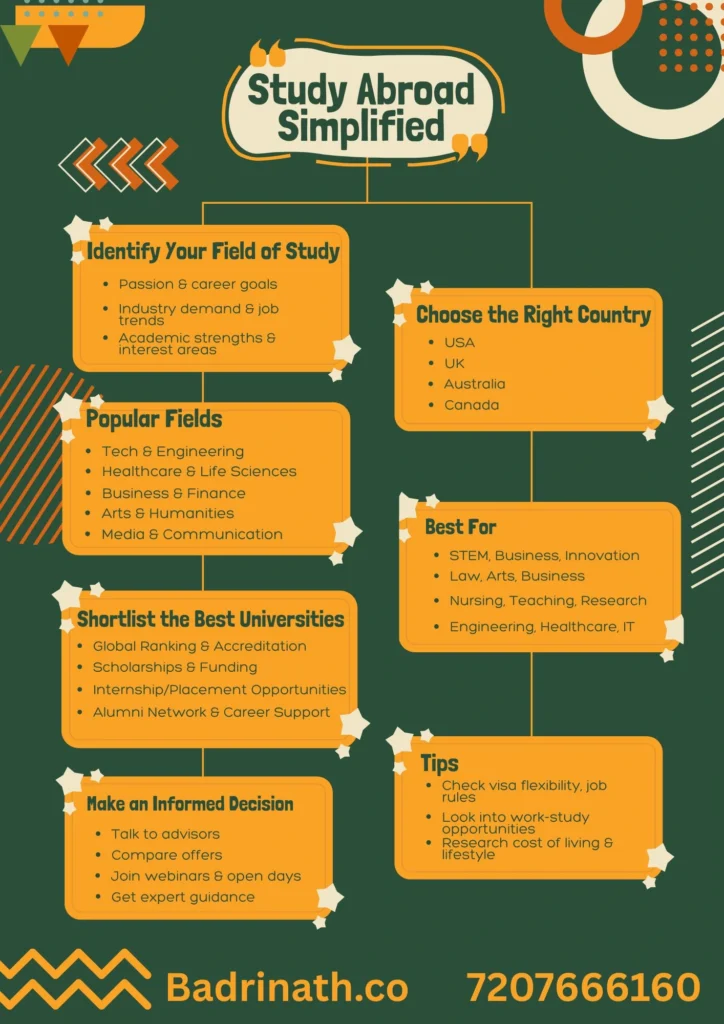Introduction
Dreaming of studying abroad but overwhelmed by choices? You’re not alone. With so many countries offering quality education, picking the right one can feel like choosing your next Netflix binge—only 10x more important. The country and university you choose can shape your academic journey, career, and even life path.

Understand Your Academic Goals
Define Your Field of Study: Before you pack your bags, get crystal clear on your goals. Are you diving into engineering, pursuing design, or planning to lead the next big startup? Knowing what you want to study narrows down your options significantly.
Research Global Demand for Your Field of study: It’s not just about where you want to study—it’s also about where your skills will be in demand. Tech talent is hot in the U.S., Germany loves its engineers, and Australia’s calling out for healthcare professionals.
Best Countries by Field of Study
Leading Country for Engineering Masters
- Germany – Low tuition, top universities (like TU Munich), and high demand for engineers.
- USA – Big names like MIT and Stanford, cutting-edge research, but it’s pricey.
- Canada – Tech-driven with co-op programs and easy PR pathways.
Prime Country for Medical Studies
- UK – Home to top med schools like Oxford and Imperial.
- Australia – High-quality healthcare training and internships.
- Poland/Hungary – Affordable and globally recognized degrees.
Best Country for Arts & Design
- Italy – Cradle of renaissance art and design.
- UK – Institutions like Central Saint Martins lead in fashion and design.
- South Korea – Trendsetting in modern design and K-culture influence.
Best Country for Business & Management
- USA – Ivy League MBAs, Wall Street networking.
- Canada – Affordable MBAs with post-study work permits.
- Singapore – Financial hub with an Asian edge.
Study Abroad Country Comparison
Comparison Table: Cost, Scholarships, Work Permits, Visa Ease
| Country | Avg. Tuition/year | Scholarships | Work While Studying | Visa Ease | PR Friendly |
| USA | $20,000 – $50,000 | Moderate | 20 hrs/week | Moderate | Difficult |
| Canada | $15,000 – $30,000 | High | 20 hrs/week | Easy | Easy |
| Germany | Mostly Free | Moderate | 20 hrs/week | Moderate | Moderate |
| UK | $15,000 – $40,000 | High | 20 hrs/week | Moderate | Tough |
| Australia | $20,000 – $35,000 | High | 40 hrs/fortnight | Easy | Easy |
Top 5 Affordable Study Abroad Destinations
- Germany
- Poland
- India (for exchange programs)
- Mexico
- Malaysia
Factors to Consider When Choosing a Country
Cost of Living and Tuition Fees: It’s not just tuition—rent, food, and lifestyle matter. Germany might offer free tuition, but cities like Munich can be expensive to live in.
Availability of Scholarships and Financial Aid: Some countries and universities offer generous aid. Look for merit-based, need-based, and government-funded programs.
Work Permit Opportunities: Want to earn while studying? Make sure your chosen country allows part-time jobs and has internship-friendly laws.
Post-Graduation Visa Rules: Can you stay and work after graduation? Canada and Australia are great for post-study work visas. The UK’s Graduate Route is also promising.
How to Choose the Right University
University Rankings and Reputation: Check global rankings like QS or Times Higher Education—but also look at program-specific rankings.
Accreditation and Curriculum: Make sure your degree will be recognized worldwide. Look into international accreditations and whether the curriculum aligns with your goals.
Campus Facilities and Location: Don’t ignore the vibe of the place. Do you prefer a city buzz or a quiet campus? Also, check for research labs, student clubs, and accommodation.
Alumni Success Stories: A university’s reputation often comes from its alumni. See who graduated and where they’re working now.
Country-Specific Benefits
Top Reasons to Study in the USA
- Diverse programs
- High research funding
- And also, Silicon Valley opportunities
Why Choose Canada?
- Immigration-friendly
- Affordable
- Excellent quality of life
Benefits of Studying in Germany
- Free education in public universities
- World-class engineering
- Strong economy
Why Choose Australia?
- PR opportunities
- Relaxed student lifestyle
- High employment rate for grads
Why Choose the UK?
- Historic universities
- Shorter course durations
- Strong academic reputation

Common Mistakes to Avoid
Following Trends Blindly: Just because your friends are going to Canada doesn’t mean it’s right for you.
Ignoring Visa and Immigration Laws: Always understand the visa restrictions, renewal conditions, and stay-back options.
Underestimating Language and Culture: If you’re not comfortable with a language or culture, it could be a lonely journey, even with the best academics.
Final Tips Before You Decide
Talk to Alumni: Nothing beats real advice from people who’ve been there, done that. Hit up LinkedIn or alumni networks.
Use Virtual Tours and Webinars: Universities offer virtual campus tours and live Q&A sessions. Don’t miss out—it gives you a real feel of the place.
Conclusion
Choosing the right country & university is a once-in-a-lifetime decision. It’s not about where everyone is going—it’s about where you’ll grow, thrive, and shine. Balance passion with practicalities like visa ease, scholarships, and future job opportunities. And remember—there’s no perfect choice, only the right fit for you.
External Links
How to choose the right university to study abroad
Choose the Right Country & University for Your Higher Education






